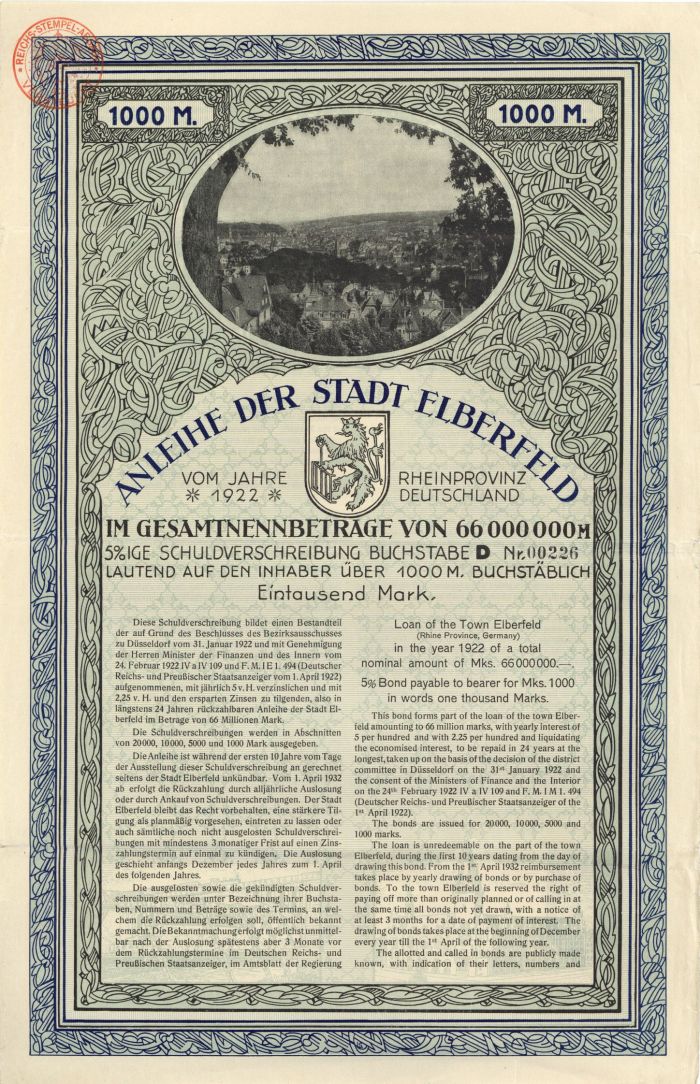Anleihe Der Stadt Elberfeld - 1,000 Mark Bond
Inv# FB6721 Bond
1,000 5% Mark Bond. Full page of unattached coupons remain. The first official mentioning of the geographic area on the banks of today's Wupper River as "elverfelde" was in a document of 1161. Etymologically, elver is derived from the old Low German word for "river." (See etymology of the name of the German Elbe River; cf. North Germanic älv.) Therefore, the original meaning of "elverfelde" can be understood as "field on the river." Elverfelde received its town charter in 1610.
In 1726, Elias Eller and a pastor, Daniel Schleyermacher, founded a Philadelphian society. They later moved to Ronsdorf in the Duchy of Berg, becoming the Zionites, a fringe sect.
In 1826 Friedrich Harkort, a famous German industrialist and politician, had a type of suspension railway built as a trial and ran it on the grounds of what is today the tax office at Elberfeld. In fact the railway, the Schwebebahn Wuppertal, was eventually built between Oberbarmen and Vohwinkel and runs through Elberfeld.
In 1888 the district of Sonnborn was incorporated into Elberfeld. In 1929 the towns of Barmen, Elberfeld, Vohwinkel, Cronenberg and Ronsdorf became a municipal entity officially called "Barmen-Elberfeld;" in the same year, the unified city administration through a vote of its council members decided to rename the newly incorporated city "Wuppertal." This took place in 1930. Today Elberfeld is the largest municipal subdivision of Wuppertal.
Notable people
- Greta Bösel (1908–1947), concentration camp guard executed for war crimes
- Arno Breker, sculptor
- Heinz Thilo, SS war criminal
- Werner Eggerath, East German politician
- Karl Germer, Outer Head of the Ordo Templi Orientis (1947–1962)
- Will Glahé, accordionist, composer, and bandleader
- Carl Grossberg, artist
- Theodor Hausmann (1880–1972), composer
- August von der Heydt (1801–1874), economist
- Eduard von der Heydt (1882–1964), banker
- Walter Kaufmann (physicist), physicist
- Hans Knappertsbusch, conductor
- Erich Koch, NSDAP Gauleiter of East Prussia, Reichskommissar of Ukraine
- Hermann Friedrich Kohlbrugge, minister
- Friedrich Wilhelm Krummacher, minister
- Johann Peter Lange, Protestant theologian
- Else Lasker-Schüler (1869–1945), poet
- Wilhelm Neumann-Torborg, sculptor
- Friedrich Philippi, historian
- Julius Plücker, mathematician and physicist
- Sigurd Raschèr, saxophonist
- Paul Ortwin Rave, art historian and director of the Berlin National Gallery
- Fritz Roeber (1851–1924), painter
- Sir Hans Wolfgang Singer, economist
- Johannes Steele (1908–1988), journalist
- Horst Stein (1901–1989), conductor
- Horst Tappert (1923–2008), actor
- Günter Wand (1912–2002), conductor
- Carl Wirths (1897–1955), politician
- Sulamith Wülfing, artist
Read more at https://en.wikipedia.org/wiki/Elberfeld
A bond is a document of title for a loan. Bonds are issued, not only by businesses, but also by national, state or city governments, or other public bodies, or sometimes by individuals. Bonds are a loan to the company or other body. They are normally repayable within a stated period of time. Bonds earn interest at a fixed rate, which must usually be paid by the undertaking regardless of its financial results. A bondholder is a creditor of the undertaking.










Ebay ID: labarre_galleries